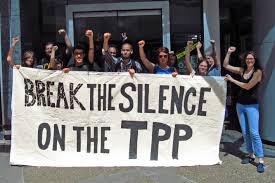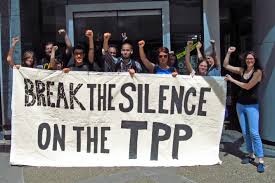
On a day that the transcripts and proceedings of the Trans-Pacific Partnership were made public, the US announced that the dozen countries that signed the Trans-Pacific Partnership have committed to refrain from competitive currency devaluations and be transparent about their exchange-rate policies.
With the aim of cutting trade barriers on items ranging from cars to rice, last month negotiators for Pacific Rim nations including the U.S., Japan, Australia and Vietnam agreed to the TPP deal. However in the US the deal still requires to be ratified by the Congress.
According to a fact sheet provided by the U.S. Treasury Department on a joint declaration that accompanies the deal, the countries have pledged to “avoid unfair currency practices and refrain from competitive devaluation”. The language of the deal on the issue is a reflection of the a statement mad issued by Group of 20 finance ministers and central bankers at a meeting in Turkey in September.
Data that shine light on their exchange-rate policies, including foreign-exchange reserves and intervention in currency markets would also be made public as promised by the TPP nations. In order to consult on exchange-rate policy, the senior officials from each country will meet at least once a year and will produce an annual report on the meetings.
As part of the agreement, the U.S. automakers and steel producers had sought enforceable currency provisions. Democratic presidential candidate Hillary Clinton cited inadequate safeguards against currency manipulation in opposing the deal last month.
In a June law, the Congress granted President Barack Obama the authority to submit trade agreements to lawmakers for an expedited, up-or-down vote without amendments. The Treasury said the declaration addresses the main negotiating objectives on currency in line with the law passed in June.
A Treasury official said that the currency declaration will rely on multilateral engagement and public pressure to enforce the commitments and transparency. The official said, briefing reporters on condition of anonymity that in the future any country that would want to join the TPP will be required to join the currency declaration and adhere to the currency related agreement.
Ford Motor Co. criticized the latest currency language, saying that it “does nothing to change the status quo.”
“It falls outside of TPP, and it fails to include dispute settlement mechanisms to ensure global rules prohibiting currency manipulation are enforced,” Ford said in an e-mailed statement.
Brunei, Canada, Chile, Malaysia, Mexico, New Zealand, Peru and Singapore are the other TPP countries. Vietnam, Singapore and Malaysia will be increasing disclosures of their foreign-exchange data such as interventions according o the provisions of the currency declaration, the U.S. official said.
While opening up a stage for a raucous debate in the U.S. Congress, details of a sweeping Pacific Rim trade deal released Thursday. However analysts also feel that the disclosure would also provide reassurances to those who are worried that the agreement could gut protections for the environment, public health and labor.
Comprising of 30 chapters that runs into hundreds of pages, the text of the Trans Pacific Partnership agreement between the U.S. and 11 other countries including Japan and Mexico, lays out the plans for the handling of trade in everything from zinc dust to railway sleepers and live eels.
(Sources: www.bloomberg.com & www.usnews.com)
With the aim of cutting trade barriers on items ranging from cars to rice, last month negotiators for Pacific Rim nations including the U.S., Japan, Australia and Vietnam agreed to the TPP deal. However in the US the deal still requires to be ratified by the Congress.
According to a fact sheet provided by the U.S. Treasury Department on a joint declaration that accompanies the deal, the countries have pledged to “avoid unfair currency practices and refrain from competitive devaluation”. The language of the deal on the issue is a reflection of the a statement mad issued by Group of 20 finance ministers and central bankers at a meeting in Turkey in September.
Data that shine light on their exchange-rate policies, including foreign-exchange reserves and intervention in currency markets would also be made public as promised by the TPP nations. In order to consult on exchange-rate policy, the senior officials from each country will meet at least once a year and will produce an annual report on the meetings.
As part of the agreement, the U.S. automakers and steel producers had sought enforceable currency provisions. Democratic presidential candidate Hillary Clinton cited inadequate safeguards against currency manipulation in opposing the deal last month.
In a June law, the Congress granted President Barack Obama the authority to submit trade agreements to lawmakers for an expedited, up-or-down vote without amendments. The Treasury said the declaration addresses the main negotiating objectives on currency in line with the law passed in June.
A Treasury official said that the currency declaration will rely on multilateral engagement and public pressure to enforce the commitments and transparency. The official said, briefing reporters on condition of anonymity that in the future any country that would want to join the TPP will be required to join the currency declaration and adhere to the currency related agreement.
Ford Motor Co. criticized the latest currency language, saying that it “does nothing to change the status quo.”
“It falls outside of TPP, and it fails to include dispute settlement mechanisms to ensure global rules prohibiting currency manipulation are enforced,” Ford said in an e-mailed statement.
Brunei, Canada, Chile, Malaysia, Mexico, New Zealand, Peru and Singapore are the other TPP countries. Vietnam, Singapore and Malaysia will be increasing disclosures of their foreign-exchange data such as interventions according o the provisions of the currency declaration, the U.S. official said.
While opening up a stage for a raucous debate in the U.S. Congress, details of a sweeping Pacific Rim trade deal released Thursday. However analysts also feel that the disclosure would also provide reassurances to those who are worried that the agreement could gut protections for the environment, public health and labor.
Comprising of 30 chapters that runs into hundreds of pages, the text of the Trans Pacific Partnership agreement between the U.S. and 11 other countries including Japan and Mexico, lays out the plans for the handling of trade in everything from zinc dust to railway sleepers and live eels.
(Sources: www.bloomberg.com & www.usnews.com)





